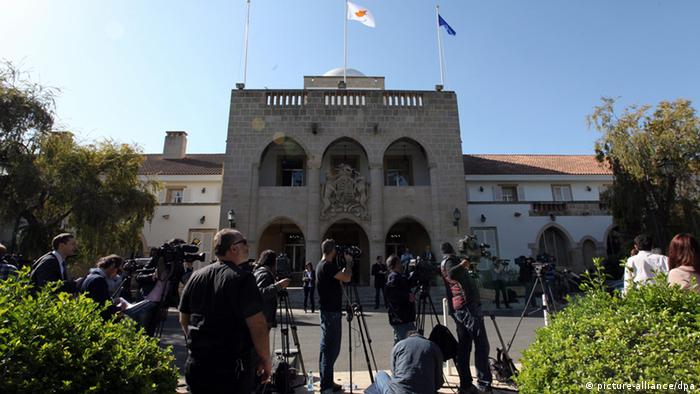All eyes are on political leaders in Cyprus, who have been holding emergency talks following the rejection of the EU bailout proposal. They are looking to Russia and the Orthodox Church for help.
Cypriot President Nicos Anastasiades, who only came to office one month ago, held talks on Wednesday with political and financial leaders in the country in preparation for fresh negotiations with officials from the EU, European Central Bank and International Monetary Fund.
The country is looking for alternative ways to raise money after the parliament rejected the pre-conditions for a European Union bailout plan.
As a condition for the 10 billion euro ($12.89 billion) bailout, eurozone leaders and international creditors had on Saturday proposed a levy on all deposits in the island's banks in order to raise 5.8 billion euros.
The 56-seat parliament on Tuesday rejected any such levy by 36 votes to 0 with 19 abstentions, to the cheers of demonstrators.
The EU proposal had broken with a taboo in so far as initial plans foresaw the levy to be imposed even on deposits of small savers. Banks were ordered to remain shut and cash machines programmed to give out a maximum of 800 euros a day to prevent savers from withdrawing their money.
The Cypriot government's attempt to renegotiate the terms of the deal with the EU and IMF has been met with rejection.
Germany has adopted a hard line on bailout terms and sees the ball firmly in Cyprus' court. "We will help only with the precondition that Cyprus adopts a viable program," said Finance Minister Wolfgang Schäuble after the Tuesday vote, suggesting that foreign investors in Cyprus should assume responsibility for helping the country solve its problems.
A safe haven for Russia's super-rich
As a result of low tax on Cyprus and the high interest rates of over four percent offered by Cyprus' banks, the island has a high level of deposits by non-EU citizens and companies, most notably from Russia.
The rating firm Moody's estimated that Russian companies and banks had up to 31 billion euros in accounts of banks on Cyprus, accounting for up to half of all deposits.
Prime Minister Anastasiades is now looking to Russia for help. On Tuesday evening he spoke with Russian President Vladimir Putin and on Wednesday Finance Minister Michael Sarris was in Moscow to negotiate the terms of a Russian loan of 2.5 billion euros.
"We're hoping for a good outcome, but we cannot really predict," Sarris told reporters.
There was speculation that state owned Russian oil and gas giant Gazprom would offer its own assistance plan in exchange for exploration rights to Cyprus' offshore gas deposits.
Orthodox Church offers help
While wealthy Russian residents of Cyprus have been reacting with anger to any proposals, which they say unfairly target their money, the island's Orthodox Church has offered to come to the rescue.
"The entire wealth of the Church is at the disposal of the country ... so that we can stand on our own two feet and not on those of foreigners," said Archbishop Chrysostomos after a meeting with the prime minister early on Wednesday.
The crisis is unprecedented in the history of the island of 1.1 million people, which suffered a war and ethnic split in 1974 in which a quarter of its population was internally displaced. Cyprus needs 15.8 billion euros to bail out its banks and shore up government finances to avoid default.
EU officials emphasised that the tax measure was to be a one-off exception, but fears have grown that savers in other, larger countries in the 17-nation eurozone might be spurred to withdraw funds.
rg/dr (Reuters, dpa, AFP) dw de

Comments